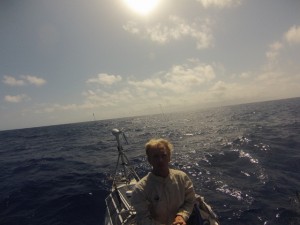
I loved reading Jordan’s blog where he used our rowboat and its limited resources as a metaphor for conservation. Our boat, like the planet earth, has limited resources and we must plan, make assumptions about, and manage their use.
Our planning, management and assumptions need to be made as a team. We are all in this boat together. If a decision is made to consume too much electricity, food, water, and the crew has not had a proper conversation about the use of said resources, then conflicts, grudges and hard feelings will arise. Resource scarcity is stressful and difficult to manage, and we need tools to ensure our conversations about resource stewardship are not only civil, but also effective.
Think about what you have to conserve when you consider renovating your house. You have a limited budget, big dreams and a contractor with certain abilities. You may say you want the deluxe kitchen with track lighting but the contractor tells you he doesn’t have the skills, or your banker informs you that this will kill the budget for your whirlpool bathtub in the bathroom, or your spouse does not like the style. You can only come to the conclusion of what is important and possible by having an ongoing and effective conversation. For those of you who have renovated a house, you know that these conversations are constant and can get very emotional and intense.
Now lets move our mind into the conservation conservation. Planet earth is far more complicated. We have many different players with countless agendas and different opinions on how our resources should be managed effectively. So how do we generate wealth while ensuring that future generations can have the same opportunity? How can we achieve a comfortable standard of living and ensure that our fellow animal, plant, fungal species on this planet have the ecological space necessary to thrive?
Here comes my suggestion: lets have constructive, continuing conversations to find the best solutions for all.
Now for my tangent… Famed psychologist and marriage researcher, Dr. John Gottman, has identified 4 communication behaviors that are signs of a marriage breakdown. Dr. Gottman named these behaviors “The Four Horsemen of the Apocalypse.” By monitoring the frequency of these habits during conversations between intimate partners, Dr. Gottman can predict with great accuracy whether a relationship will fail or succeed. And he can do this in minutes.
http://www.youtube.com/watch?v=CbJPaQY_1dc
Now lets bring this idea back to the conservation conversation. Monitoring negative relationship habits will not only make your romances more effective, but will also make social, political, and business relationships thrive. The key is to raise awareness of your destructive and ineffective use of the habits of the Four Horsemen. If all parties involved in the conservation conservation decide to reduce the habits of the Four Horsemen, sooner then we will find innovative solutions. We will create better families and work-team environments. As a result, we will create a better world for all.
The Four Horsemen are listed below. Think and acknowledge how they exist in your life. Reduce ‘em:
1. Contempt = Talking down with hurtful, mean sarcasm and humor. Passive-aggressive humor and hurtful putdowns are used while talking about random topics.
2. Criticism = This is complaining on steroids. You not only complain about what is wrong but you make the offender a bad person. The offender is no longer a mistake-prone human being, or collection of human beings who did something stupid; rather, he/she/they are now a completely and utterly stupid people.
3. Defensiveness = Reacting to feedback by blaming everything on your partner or others. You make yourself the victim and take zero responsibility for the status of your relationship.
4. Stonewalling = Checking out of the conversation both mentally and emotionally, or sometimes even refusing to talk. You take steps to avoid the real issues and avoid the difficult conversations.
